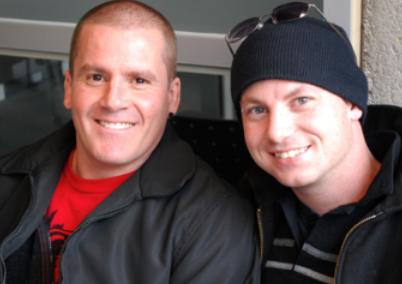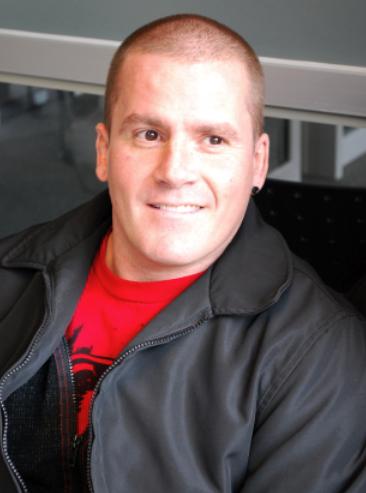
Ray Collingham with his partner, Brian Wood. Credit: Matt Mills
Ray Collingham had been coaching kids in gymnastics for 20 years when a sexual exploitation accusation destroyed his career and left him financially crippled.
A student falsely accused the soft-spoken Durham, Ontario, coach of sexually assaulting him over several years, thrusting Collingham into a two-year legal nightmare.
Despite being acquitted on all charges in 2009, Collingham says the nightmare hasn’t ended, and he continues to endure ridicule and depression. He’s now suing the Peterborough police for $5 million, alleging they were negligent in their investigation.
Even though his coaching licences were reinstated, he’s found it difficult to return to working with kids. The media coverage of his acquittal was far less extensive than that of his arrest. There is still a lot of suspicion in his community, and some parents and athletes believe the rumours.
He now coaches on a volunteer basis and is trying to start a personal training business.
“Some of the teenagers at the gym have come up to me and said, ‘We heard a rumour that you were a sex offender.’ I told them, ‘No, I was falsely accused and found innocent,’” Collingham says. “Some of them won’t talk to me after that. It’s humiliating, it’s embarrassing, but I don’t know what to do.”
It follows Collingham outside the gym, too.
“Four months ago, I was sitting at a pub and a couple walked in. They made a couple comments to me. She said, ‘Aren’t you from BC? What are you doing back here? I read about you in the paper, sick-o.’ I told her I was acquitted and she said, ‘Whatever,’ and rolled her eyes.”
*
Collingham took up gymnastics at age 11, going on to became a provincial champion in all six disciplines: rings, pommel horse, high bar, parallel bars, floor and vault. He began coaching at 18 and has coached champions at the national, provincial and regional levels.
Collingham kept his sexuality to himself at work, saying he “didn’t want any discomfort with the parents.”
Coaching kids was a dream job.
“I like the gratification of taking an athlete and making them the best that they can be. I think that’s rewarding to see someone progress and succeed,” he says.
In January 2002, he began coaching an 11-year-old boy whose identity remains a secret due to a publication ban. We’ll call him BA.
BA’s home life was marked by domestic abuse, a mentally ill mother and visits from the Children’s Aid Society. He soon became close to Collingham and came to rely on him.
In July 2004, BA’s mother left her abusive husband, taking BA and his sister with her. Collingham and his partner invited the three of them to move into their home.
“That got turned around on us,” Collingham says. “They said it looked like we were grooming them for exploitation.”
BA’s mother started doing drugs, attempted suicide and came on to Collingham. When he rejected her advances, she reunited with her husband and they told Collingham he couldn’t see BA anymore. However, BA and Collingham remained in touch via email.
A year later, Collingham and his partner moved to Smithers, BC, where he had another coaching job. Then, on July 9, 2007, the RCMP arrested Collingham and sent him back to Ontario. He spent 10 days in jail without bail.
*
It was eventually proven that BA’s mother had hacked into Collingham’s email account and concocted a phony correspondence between Collingham and her son, detailing graphic but fictional sexual encounters.
On June 15, 2007, an officer with Peterborough Lakefield Police Service pulled BA out of school for questioning. According to Collingham’s legal filings, the interrogation violated multiple rules of procedure. BA was not told why he was being questioned, was not interviewed with his parents present, and no recording was made of the interview.
BA said Collingham didn’t do anything, but he was told that if his story didn’t match his mother’s, she could be charged for lying.
BA relented and agreed to record a statement that Collingham had abused him.
Durham Regional Police Service took over and charged Collingham with seven counts of sexual assault, four counts of sexual interference, two counts of invitation to sexual touching, and two counts of sexual exploitation.
*
Durham police released Collingham’s name and photo to the media as part of an appeal for other victims to come forward. None did.
In fact, there had never been a prior complaint against Collingham. Nevertheless, he was fired from his job and both Gymnastics BC and Gymnastics Ontario issued warnings.
Collingham was released on bail and spent the next two years preparing for trial. He was barred from being near children, making it impossible to work.
“My court case cost $300,000,” Collingham says. “I lost everything I own, everything down to my ID. My partner and I had to sell everything to get back to Ontario and pay for the lawyer. My family helped support me, and I was on social assistance to cover food.”
In the end the Crown had no case. The statements from BA and his mother were contradictory and the evidence bogus. The Crown tried to have the case quietly dropped, but Collingham pushed for a trial.
“We didn’t want to get off on a technicality,” he said. “We wanted the court to acknowledge that I’m innocent.”
BA testified that Collingham gave him a blowjob on a waterslide at Canada’s Wonderland. Under pressure on the stand, BA’s mother admitted she fabricated incriminating emails because she was in love with Collingham.
Following a two-week trial and three weeks of deliberations, Collingham was fully acquitted.
*
Shortly after the trial, BA contacted Collingham to apologize and recant his story.
“There wasn’t a big reason why,” says Collingham. “It was, ‘I’m sorry. I was put in a position I didn’t want to be in.’ I cried. Then I actually went into a depression for a little while. I thought I’d get a reason why and there really wasn’t one. Shit happens. That’s it.”
It wasn’t the whims of fate that destroyed Collingham’s life. A woman hacked into two email accounts, created a fraudulent correspondence, gave false information to three police services, and committed perjury. A police officer bullied false testimony out of a teenager. Then, relying on flimsy evidence, a police service publicized the most vile charge that can be levelled against a man.
No charges have been laid against BA’s mother for her crimes. Durham police told Collingham they refused to investigate despite her in-court confession.
“Their attitude was, ‘What’s your problem? You were acquitted. The system worked for you,’” Collingham says.
Durham Regional Police Service declined to comment.
But why did the police leap to charge Collingham on faulty evidence? Why wasn’t an investigation conducted before arresting him?
Did they simply draw a line between a gay man and a possibly gay teenaged boy (Collingham says BA came out to him by email several months after the trial) and conclude that their relationship must be predatory?
The accusation of pedophilia can drive people to extremes.
Shortly after Collingham’s acquittal, David Dewees, a teacher at Toronto’s Jarvis Collegiate, was accused of having inappropriate communications with two teenaged boys he’d met while working at a camp. The Toronto Star misreported that Dewees was accused of sexually assaulting the boys. In the frenzy that followed, media published Dewees’ name, photo and full address. Two days after his arrest, Dewees threw himself in front of a subway train.
We’ll never know why Dewees committed suicide. The Star’s Rosie Dimanno chose to interpret it as an admission of guilt in a column that accused him of all the worst crimes he’d been charged with and more.
But shouldn’t the police be more diligent in their investigations before releasing such charges to the public? Should the media be held to a higher standard?
“I’m all for helping the police,” Collingham says. “I just think they should be a little more careful when releasing names to the media. If there’s not a history, then pull back a bit and do an investigation. There should be some procedure at least.”


 Why you can trust Xtra
Why you can trust Xtra


